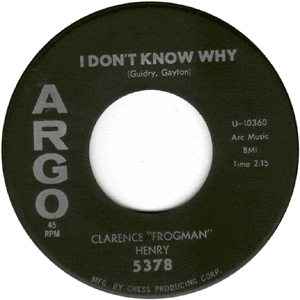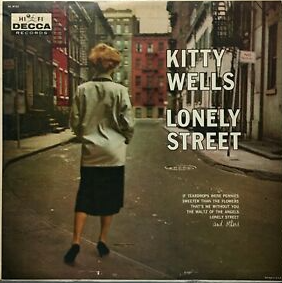Argo Records was a record label in Chicago that was established in 1955 as a division of Chess Records.
Clarence Henry II, known as Clarence "Frogman" Henry, is an American rhythm and blues singer and pianist, best known for his hits "Ain't Got No Home" (1956) and "(I Don't Know Why) But I Do" (1961).
"You Always Hurt the One You Love" is a pop standard with lyrics by Allan Roberts and music by Doris Fisher. First recorded by the Mills Brothers, whose recording reached the top of the Billboard charts in 1944, it was also a hit for Sammy Kaye in 1945.

Sentimentally Yours is the third studio album by American country music singer Patsy Cline, released August 6, 1962. The album was the final studio album Cline would release before her death in a plane crash less than a year later.

Lonely Street is the fifth studio album by American pop singer Andy Williams, released in late 1959 through Cadence Records. This, his fifth LP of new material for the label, is described by William Ruhlmann on AllMusic.com as "an album full of songs of lost love and loneliness that found Williams using more of the Mel Tormé-like foggy lower register of his voice." The liner notes on the back of the album jacket read, "The selections in Lonely Street, Andy confides, are those for which he feels a special affection. Every vocalist has a few personal favorites... and it is quite clear to the listener that this collection presents songs which Andy Williams believes, feels -- and loves."

"(I Don't Know Why) But I Do" is an R&B song written by Paul Gayten and Bobby Charles, and performed by Clarence "Frogman" Henry.

Walk Through This World with Me is an album by American country music artist George Jones released in 1967 on the Musicor Records label.
Clarence is a masculine given name. Notable people with the name include:

The Everly Brothers Sing Great Country Hits is an album by the Everly Brothers, originally released in 1963. It was re-released on CD in 2005 on the Collectors' Choice Music label.

Canadian Sunset is a compilation album by American pop singer Andy Williams that was released in the spring of 1965 by Columbia Records. The cover bears the phrase "formerly titled Andy Williams' Best" underneath the title, suggesting that the same songs can be found here that were on that 1961 release by Cadence Records, but his number one hit "Butterfly" and its top 10 follow-up "I Like Your Kind of Love" that were included on the Cadence album were replaced on this release with the B-sides of two of the other songs here.

May Each Day is a compilation album by American pop singer Andy Williams that was released in the UK in early 1966 by the CBS Records division of Columbia. A similar collection titled Andy Williams' Newest Hits had the same cover photo and design, but there were only five songs that they had in common. Whereas that release focused exclusively on Columbia recordings, May Each Day also included songs that Williams cut during his time with Cadence Records, and while several of the tracks here were chart hits in the US, only the title track reached the singles chart in the UK.

Andy Williams' Greatest Hits Vol. 2 is a compilation album by American pop singer Andy Williams that was released in June 1973 by Columbia Records. This collection follows in the footsteps of its predecessor, Andy Williams' Greatest Hits, in that it is not limited to his biggest and most recent hit singles, although his final two US Top 40 entries were included. It also has an album track not released as a single, a couple of hits from his time with Cadence Records, two other singles that could have been included on the first volume, and two Easy Listening chart entries that never made the Billboard Hot 100.

Greatest Hits is a live album by American pop singer Andy Williams that was digitally recorded live in concert at the Andy Williams Moon River Theater in Branson, Missouri and released by the LaserLight division of Delta Music Inc. in 1994. It includes performances of songs that he had previously recorded during his time with the Cadence and Columbia labels as well as one he had never recorded before -- "L-O-V-E", which Nat King Cole took to number 81 pop and number 17 Easy Listening in Billboard magazine in 1964.

Carl Robert Belew was an American country music singer and songwriter. Belew recorded for Decca, RCA Victor, and MCA in the 1950s through 1970s, charting 11 times on Hot Country Songs. He also wrote singles for Johnnie & Jack, Eddy Arnold, Jim Reeves, and others.
"Lonely Street" is a 1956 song written by Carl Belew, Kenny Sowder, and W.S. Stevenson, originally performed by Belew, and later by Dave Rich. Its most successful rendition was by Andy Williams, whose version reached #5 on the Billboard chart and #20 on the R&B chart in 1959. The song appeared on his 1959 album, Lonely Street. Archie Bleyer's Orchestra played on the song.

16 Most Requested Songs: Encore! is a compilation album by American pop singer Andy Williams that was released by Columbia Records on May 16, 1995.

The Very Best of Andy Williams is a compilation album by American pop singer Andy Williams that was released by Sony Music Entertainment on February 7, 2000.
"Ain't Got No Home" is a song written and originally recorded by American rhythm-and-blues singer and pianist Clarence "Frogman" Henry. It was released as a single in the United States on December 15, 1956.

Lonely Street is an album recorded by Kitty Wells and released in 1958 on the Decca label. Thom Owens of AllMusic found it "slightly uneven but enjoyable". On November 17, 1958, it was ranked No. 9 on Billboard magazine's "Favorite C&W Albums" based on the magazine's annual poll of country and western disc jockeys.
"Lonely Street" is a song written by Joe Bisco and performed by Clarence "Frogman" Henry. In 1961, the track reached No. 19 on the U.S. R&B, No. 42 on the UK Singles Chart, and No. 57 on the Billboard Hot 100.












